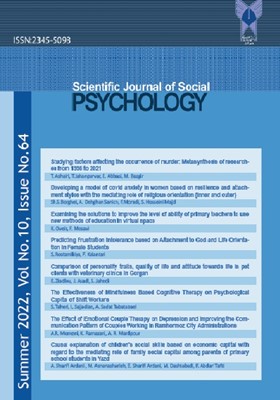Predicting Frustration Intolerance based on Attachment to God and Life Orientation in Female Students
Subject Areas : social psychology
fariba kalantari
1
*
![]() ,
sakina rostamikiya
2
,
sakina rostamikiya
2
1 - Department of psychology
2 - university
Keywords: Attachment to God# Life Orientation# Frustration Intolerance,
Abstract :
The purpose of this study was to predict frustration intolerance based on attachment to God and life orientation in female students in Ramhormoz. The statistical population of this study was all female students in Ramhormoz. The statistical sample of the present study was 320 people from the mentioned population who were selected by multi-stage cluster sampling method. Scheier and Carver (1985) Life Orientation Test, Beck and McDonald Attachment to God inventory (2004) and Harrington Frustration Tolerance Scale (2005) were used to collect data. Data were analyzed using Pearson correlation coefficient and stepwise multivariate regression statistical methods. The results showed that there was a negative and significant relationship between attachment to God and life orientation with frustration intolerance. Therefore, based on the findings of this study, it is suggested that in educational centers to increase and improve the tolerance of students against frustration and increase their psychological health to the variables of attachment to God and life orientation attention be special.
خدایی، ع؛ زارع، ح؛ علیپور، ا؛ شکری، ا. (1395). ویژگیهای روانسنجی نسخه تجدیدنظر شده آزمون جهتگیری زندگی. فصلنامه روانشناسی کاربردی، 10، 3 (39)، 405-387.
علیائی، ز؛ سامانی، س؛ فانی، ح. (1390). بررسی روایی و پایایی مقیاس دلبستگی به خدا. مجله روشها و مدلهای روانشناختی، 2 (2)، 81-65.
میلانیفر، ب. (1399). بهداشت روانی. تهران، انتشارات قومس.
نبیزاده، ه؛ لیاقت، ر. (1398). بررسی ویژگیهای روانسنجی پرسشنامه تحمل ناکامی و رابطه آن با استرس ادراک شده در دانشآموزان دختر متوسطه اول شهر تهران. ششمین کنفرانس بینالمللی دستاوردهای نوین پژوهشی در علوم اجتماعی، علوم تربیتی و روانشناسی، اصفهان. https://civilica.com/doc/1013971
نصیری، ح؛ لطیفیان، م. (1387). دلبستگی به خدا، عواطف مثبت و رضایت از زندگی. مجموعه مقالات چهارمین سمینار سراسری بهداشت روانی دانشجویان، دانشگاه شیراز، 475.
نوروزی، ا؛ مومنی یانسری، ع. (1391). خودکارآمدی عمومی، امید به زندگی و جهتگیری زندگی در زنان سالمند بهرهمند از آموزش. مجله روانشناسی معاصر، 3149-3146، (ویژهنامه)، 7.
هدایتینیا، ز. (1395). پیشبینی تحمل ناکامی بر اساس ذهنآگاهی و معنای زندگی در مادران کودکان مبتلا به اختلال طیف اتیسم. پایاننامه کارشناسی ارشد، دانشکده روانشناسی و علوم تربیتی، دانشگاه آزاد اسلامی واحد تهران شمال.
Adineh Salarvand, R., & Rezaei Jamalouei, H. (2020). Gratitude to God and spiritual intelligence affecting the increase of frustration tolerance for Iranian students. Islam and Health Journal, 5(1), 27-34.
Berkowitz, L. (2012). A different view of anger: The cognitive‐neo association conception of the relation of anger to aggression. Aggressive behavior, 38(4), 322-333.
Chand, L. (2015). A study of frustration tolerance in relation to achievement motivation and sports achievements. International Journal of Applied Research, 1(6), 92-94.
Damirchi, E. S., Mohammadi, N., Ramezani, S., & Amanzad, Z. (2018). The effectiveness of spirituality group therapy on happiness and hardiness in elderly women. J Res Reli Health, 4(2), 42-53.
de Souza, A., & Kamble, S. V. (2016). Spirituality and Gratitude as Predictors of the Quality of Life in Adult Cancer Patients. The International Journal of Indian Psychology, 3(2), 40-47.
Harrington, N. (2005). The frustration discomfort scale: Development and psychometric properties. Clinical Psychology & Psychotherapy: An International Journal of Theory & Practice, 12(5), 374-387.
Jovanović, V., & Gavrilov-Jerković, V. (2013). Dimensionality and validity of the Serbian version of the Life Orientation Test-Revised in a sample of youths. Journal of Happiness Studies, 14(3), 771-782.
Krause, N., Bruce, D., Hayward, R. D., & Woolever, C. (2014). Gratitude to God, self‐rated health, and depressive symptoms. Journal for the Scientific Study of Religion, 53(2), 341-355.
Li, J., Xu, X., Sun, J., Cai, W., Qin, T., Wu, M., & Liu, H. (2020). Activities of daily living, life orientation, and health-related quality of life among older people in nursing homes: a national cross-sectional study in China. Quality of Life Research, 29(11), 2949-2960.
Love, N. S., Merlo, C. A., Hall, M. E. L., & Hill, P. C. (2021). Attachment to God and Quest as Moderators of the Relationship between Religious Doubt and Mental Health. Journal of Psychology and Theology, 0091647121992409.
Naroei, R., & Salehi, A. M., Jandaghi Gh. (2013). The Effect of God's Remembrance on Self-Restraint Based on Islamic Resources. Psychology Religion Journal, 6(2), 19-29.
Ottosen, K. O., Goll, C. B., & Sørlie, T. (2019). ‘From a sense of failure to a proactive life orientation’: First year high school dropout experiences and future life expectations in Norwegian youth. International Social Work, 62(2), 684-698.
Pettit, R. M. (2021). The relationship between religiosity, generosity, and empathy among young adults: The mediating role of secure attachment to God. Fuller Theological Seminary, School of Psychology.
Plewnia, C., Schroeder, P. A., Kunze, R., Faehling, F., & Wolkenstein, L. (2015). Keep calm and carry on: improved frustration tolerance and processing speed by transcranial direct current stimulation (tDCS). PLoS One, 10(4), e0122578.
Scheier, M. F., & Carver, C. S. (1985). Optimism, coping, and health: assessment and implications of generalized outcome expectancies. Health psychology, 4(3), 219.
Scheier, M. F., Carver, C. S., & Bridges, M. W. (1994). Distinguishing optimism from neuroticism (and trait anxiety, self-mastery, and self-esteem): a reevaluation of the Life Orientation Test. Journal of personality and social psychology, 67(6), 1063.
Steca, P., Monzani, D., Pierobon, A., Avvenuti, G., Greco, A., & Giardini, A. (2017). Measuring dispositional optimism in patients with chronic heart failure and their healthcare providers: the validity of the Life Orientation Test-Revised. Patient preference and adherence, 11, 1497.
Wang, S. Y., Wong, Y. J., Yeh, K. H., & Wang, L. (2018). What makes a meaningful life? Examining the effects of interpersonal harmony, dialectical coping, and nonattachment. Asian Journal of Social Psychology, 21(3), 198-204.
Wood, A. M., Froh, J. J., & Geraghty, A. W. (2010). Gratitude and well-being: A review and theoretical integration. Clinical psychology review, 30(7), 890-905.
_||_

